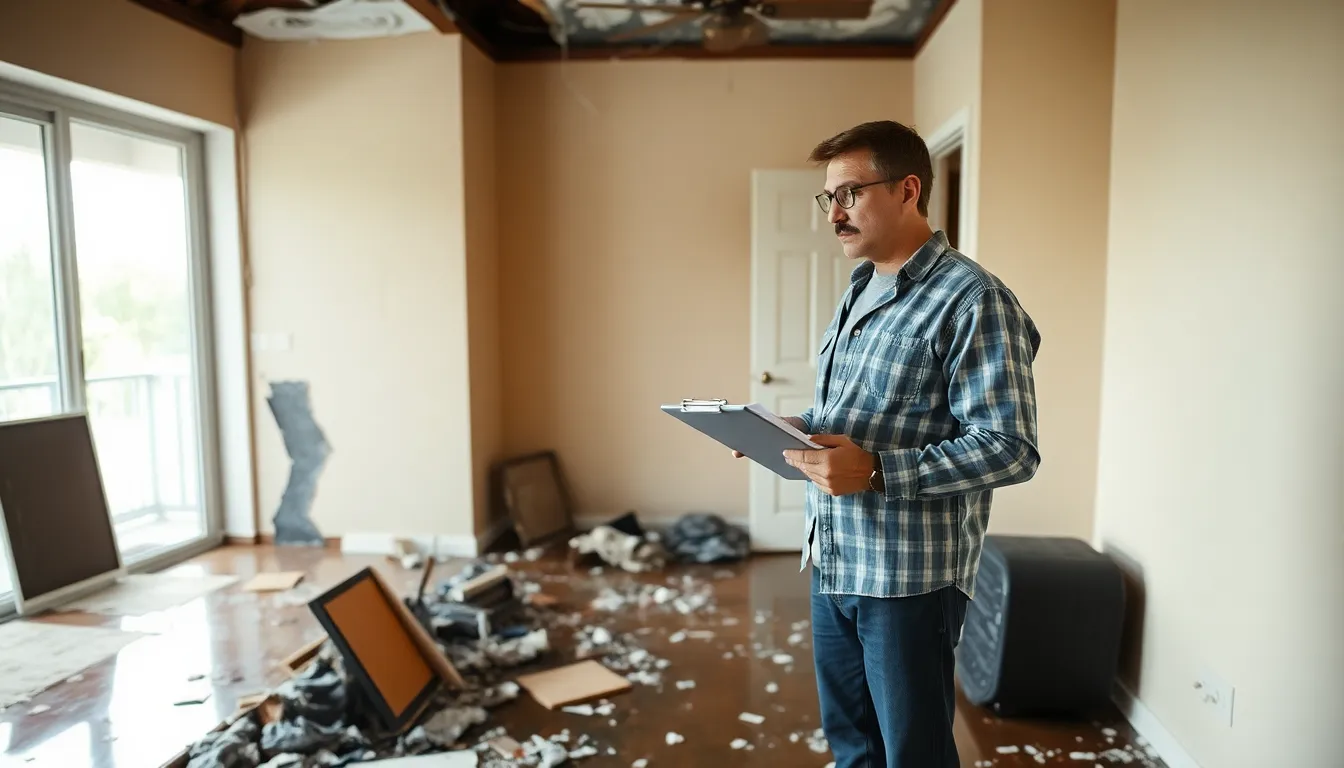When disaster strikes, the last thing renters want to worry about is their rights. Whether it’s a hurricane, flood, or that unexpected raccoon invasion, knowing what protections are in place can make all the difference. After all, navigating the chaos of a disaster shouldn’t feel like trying to find a Wi-Fi signal in the middle of the woods.
Renters have rights that can help them bounce back from these unexpected events, but many don’t even know they exist. From emergency repairs to lease terminations, understanding these rights can turn a stressful situation into a manageable one. So grab your favorite snack and settle in, because knowing your renter rights during a disaster might just save your sanity—and your home.
Table of Contents
ToggleUnderstanding Renter Rights During Disaster
Renters facing disasters such as hurricanes or floods often experience confusion regarding their rights. Knowing these rights aids in navigating difficult situations. Renters typically have the right to safe housing, meaning landlords must ensure properties meet health and safety standards during emergencies.
Emergency repairs require prompt action. Landlords are generally obligated to address critical issues, such as plumbing failures or lack of heat, within a reasonable timeframe. For instance, many states mandate that landlords must respond to repair requests immediately after a disaster-related event.
Termination of leases presents another important aspect. Renters can often terminate leases if the property sustains significant damage, making it uninhabitable. For example, a tenant whose apartment floods due to a natural disaster might provide notice of lease termination to their landlord to avoid financial burdens.
Some regions also offer rental assistance programs during disasters. These programs may provide financial support for temporary housing or help with unpaid rent due to lost income.
Communication with landlords remains crucial. Documenting all interactions regarding repairs or lease concerns helps establish a record for future reference.
Understanding these aspects of renter rights enables better decision-making during emergencies. Engaging with local tenant organizations or legal aid can provide additional clarity and assistance.
Types of Disasters Affecting Renters
Renters face various types of disasters that can impact their living conditions and rights. Understanding these disasters helps renters be prepared and aware of their rights.
Natural Disasters
Natural disasters include hurricanes, floods, tornadoes, earthquakes, and wildfires. Each of these events can cause significant damage to rental properties, making them unsafe or uninhabitable. Renters may exercise their right to terminate leases if their homes sustain severe damage. Landlords are obligated to conduct repairs quickly and restore essential services. After a hurricane, for instance, renters should document property damage and communicate with their landlords about repair timelines. Floods often lead to additional issues like mold, making prompt action vital for health and safety.
Man-Made Disasters
Man-made disasters encompass events such as chemical spills, terrorist attacks, or building collapses. These incidents can create hazardous conditions for renters. Landlords must act swiftly to mitigate risks and repair affected areas. Renters should seek assistance from local authorities and document any hazards. In some cases, they might need to evacuate until the property is safe. Understanding rights related to lease termination and repairs allows renters to navigate man-made disasters effectively, ensuring their safety and well-being. Engaging with legal aid can provide essential guidance during these challenging times.
Legal Protections for Renters
Renters facing disasters must understand their legal protections. These laws ensure safety and provide recourse during emergencies.
Federal Laws
The Fair Housing Act prohibits discrimination against renters. It requires landlords to provide safe living conditions during natural disasters. Federal policies ensure that assistance programs are in place for financial aid. The Federal Emergency Management Agency (FEMA) offers support to those affected by major disasters through rental assistance. Renters can apply for help within specific time frames after a disaster declaration.
State Laws
State laws vary significantly and can provide additional protections. Many states have specific statutes addressing tenant rights during emergencies. These laws often require landlords to maintain habitability even in stressful situations. For instance, some states allow renters to break leases if properties become uninhabitable due to disaster damage. Additionally, state agencies may administer funds for renters struggling to pay rent post-disaster, enhancing support during recovery. Each renter should verify local statutes for tailored protections.
Responsibilities of Renters During a Disaster
Renters must understand their roles during disasters. Taking proactive measures and communicating with landlords play a significant part in ensuring their safety and well-being.
Communicating with Landlords
Effective communication with landlords is essential. Renters should report any damage promptly to facilitate quick repairs. Documenting all interactions helps maintain a clear record for future reference. Regular updates on repair timelines can alleviate concerns about habitability. Responsiveness from both parties fosters a cooperative environment during emergencies, making recovery smoother for everyone involved. Whenever possible, reaching out in writing strengthens the communication trail and provides proof of reported issues.
Evacuation Procedures
Renters should familiarize themselves with evacuation procedures well before a disaster strikes. Knowing the safest routes and local regulations can save crucial time during emergencies. Local authorities often provide specific guidance on evacuation notices, making it essential to stay updated via reliable sources. Following designated evacuation routes minimizes traffic congestion and enhances safety. While evacuating, renters must prioritize personal belongings and pets, ensuring a quick and efficient exit. Keeping an emergency kit ready also supports a smoother evacuation process, facilitating safety during unexpected situations.
Resources for Renters in Need
Renters facing disaster situations can access various resources for assistance. Knowledge of available support systems can help alleviate stress during emergencies.
Nonprofit Organizations
Nonprofit organizations play a crucial role in supporting renters. Many offer resources like emergency funds, legal assistance, and housing support. For example, the Red Cross provides shelter and basic necessities following disasters. Local organizations may also operate food banks or help with temporary housing. Connecting with groups such as the National Low Income Housing Coalition can lead to state-specific resources for renters. Seeking help from these nonprofits often brings much-needed relief and guidance to navigate the complexities of rental issues during disasters.
Government Assistance Programs
Government assistance programs provide vital support to affected renters. FEMA, for example, offers rental assistance to individuals who experience loss due to major disasters. State government programs might also exist, reflecting local regulations and resources. Financial aid for unpaid rent or temporary housing can ease the burden on affected individuals. Many areas have housing authorities that administer these programs and provide information on eligibility. Understanding and applying for government assistance can significantly improve recovery efforts for renters in need during pivotal times.
Conclusion
Understanding renter rights during disasters is crucial for maintaining safety and securing housing. By being informed about their rights regarding repairs and lease terminations, renters can effectively navigate challenging situations.
Proactive communication with landlords and documenting all interactions can help ensure that necessary repairs are made promptly. Additionally, knowing about available resources and assistance programs can significantly ease the burden during recovery.
Renters who take these steps not only protect themselves but also empower their communities to respond more effectively in times of crisis.




